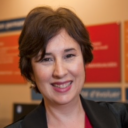The certificate in philanthropic management of the Université de Montréal has partnered up with PhiLab in launching the 2019-20 academic year with a public conference. Hilary Pearson, CEO and president of Philanthropic Foundations Canada from 2001 to 2019, was the spokesperson for the event.
Mrs. Pearson reiterated the many systemic changes that have taken place over the last 20 years in the Canadian philanthropic sector. Philanthropic Foundations Canada proved to be, since its founding in 1999, a key actor in professionalizing the grantmaking foundation sector, bridging Canadian philanthropic practices from coast to coast and forming a community keen on learning and exchanging around complex issues such as social exclusion and climate change, and how to intervene.
Despite this progress, Mrs. Pearson also asked the following question: ‘Why was it so difficult to have large charitable organisations in Canada in 2019?’ The answer rests in part on the antiquated services available to foundations who are fighting against the sector’s emerging reality. Technology is rapidly changing the way organisations interact with their donors, volunteers and their partners, while the regulatory and legal framework remain rigid, unchanging, thus limiting the latitude and reach of philanthropic actions.
Modernising the regulations, norms and laws that govern the charitable organisations is urgent in order to support the important work they do in the current state of social deficit. With this in mind, Mrs. Pearson presented the Advisory Committee for the Charitable Sector’s mandate, a committee recently formed by the Liberal party in power today, and for which she will be the co-president. The committee’s role is to open a dialogue between the Canadian government and the charitable sector, to help evolve the understanding of the issues faced by the charitable sector and to ensure that the regulatory environment supports the vital work of these organisations. Will the elections of the 21st of October compromise the sector’s progress by electing the Conservatives? Only time will tell.
Mrs. Pearson’s speech ended with an invitation to the academic community and to students to pursue both partnership-oriented and theoretical research in the sector to allow for the transition to a form of philanthropy that is more likely to participate in social innovation.
Caroline Bergeron is Director of PhiLab’s Quebec
This article was originally published on the PhiLab blog on 24 September 2019. The original article can be viewed here.






Comments (0)